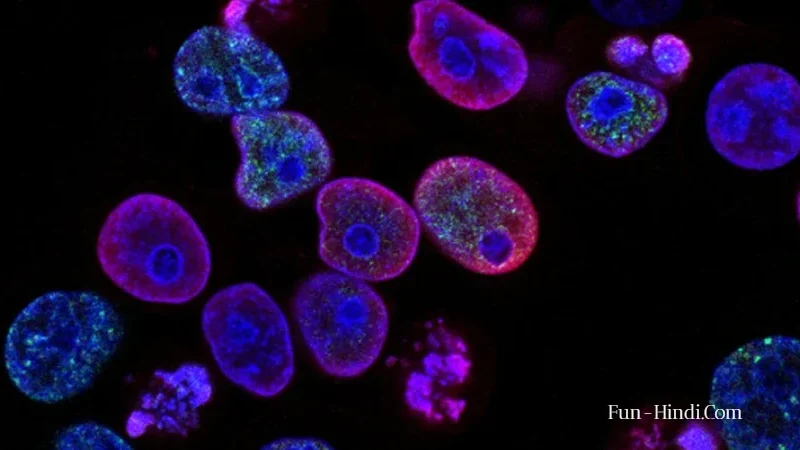Liver cancer, specifically hepatocellular carcinoma (HCC), is a formidable adversary in the realm of oncology. This aggressive cancer type often presents a grim prognosis, but recent advancements in medical science are shining a ray of hope.
Gene therapy, specifically involving vesicles, has emerged as a promising avenue for the treatment of liver cancer. In this article, we will delve into the intricacies of liver cancer, the potential of gene therapy, and the role vesicles play in this innovative approach.
Understanding Hepatocellular Carcinoma (HCC)
Hepatocellular carcinoma, commonly known as liver cancer, primarily originates in the hepatocytes, the main cell type in the liver. It is a global health concern, ranking as the sixth most common cancer and the fourth leading cause of cancer-related deaths worldwide. Chronic liver diseases, viral infections, excessive alcohol consumption, and obesity are some of the key risk factors associated with the development of HCC.
Read Also: Erindale Health Centre: Your One-Stop Shop for Healthcare
The Current Landscape of HCC Treatment

Traditionally, the treatment options for HCC have included surgical resection, liver transplantation, radiation therapy, and systemic chemotherapy. However, these methods often have limited efficacy, especially when the cancer is diagnosed at an advanced stage. Additionally, these treatments can have significant side effects, making it essential to explore novel approaches.
Gene Therapy: A Revolutionary Approach
Gene therapy is a cutting-edge medical strategy that involves altering or replacing faulty genes to treat or prevent diseases. In the context of HCC, gene therapy holds tremendous potential. Researchers are working on several gene therapy techniques to target liver cancer at its core.
Read Also: Abacus Care Health Insurance: What You Need to Know
Targeting Oncogenes
One approach involves targeting oncogenes, which are genes that can cause normal cells to become cancerous when mutated or overexpressed. By using gene therapy, scientists aim to inhibit these oncogenes, curbing the growth and proliferation of HCC cells.
Boosting Tumor Suppressor Genes

Conversely, another avenue of gene therapy focuses on tumor suppressor genes, which are responsible for regulating cell growth and preventing the formation of tumors. Gene therapy can enhance the activity of these genes, bolstering the body’s natural defenses against HCC.
Immune System Activation
Gene therapy can also activate the immune system to recognize and destroy cancer cells more effectively. This approach, known as immunotherapy, has shown promise in various cancer types, including HCC.
Read Also: Health benefits of Kiwi fruit In English
The Role of Vesicles in Gene Therapy

Vesicles play a pivotal role in gene therapy for liver cancer. These tiny, membrane-bound sacs are used as delivery vehicles for therapeutic genes. Researchers have developed various types of vesicles, such as liposomes and exosomes, to encapsulate and transport the genetic material to the target cells.
Liposomes
Liposomes are synthetic vesicles made of lipid bilayers. They can be engineered to carry specific genes and molecules, ensuring targeted delivery to HCC cells while minimizing damage to healthy tissue. Liposomes have the advantage of being versatile and easily customizable for different gene therapy strategies.
Exosomes
Exosomes, on the other hand, are naturally occurring vesicles secreted by cells. They have gained attention for their role in intercellular communication and as carriers of therapeutic cargo. Researchers are harnessing the potential of exosomes to deliver therapeutic genes to HCC cells, exploiting their inherent ability to navigate biological barriers.
Read Also: Coconut water health benefits and side-effects
Conclusion: The Bright Horizon of Liver Cancer Treatment

In the battle against hepatocellular carcinoma, gene therapy with vesicles is a beacon of hope. This innovative approach holds promise for more effective, targeted, and less invasive treatments for liver cancer. As research continues to advance,
We can anticipate breakthroughs that may revolutionize the landscape of HCC treatment, offering renewed optimism to patients and healthcare providers alike.
In summary, hepatocellular carcinoma, or liver cancer, is a formidable foe, but gene therapy, in conjunction with vesicles, offers a promising path forward. By targeting oncogenes, enhancing tumor suppressor genes, and activating the immune system,
Gene therapy holds the potential to transform the prognosis for HCC patients. With liposomes and exosomes as delivery vehicles, this innovative approach represents a significant step toward more effective and personalized liver cancer treatment strategies.
Read Also: How to stop overthinking and negative thoughts | 7 Effective Strategies
Remember, early detection and consultation with healthcare professionals remain crucial in the battle against HCC. Stay informed about the latest advancements in liver cancer research to make well-informed decisions regarding your health or the health of your loved ones.
FAQ’s on “Liver cancer • Gene therapy • Vesicle • Hepatocellular carcinoma

1. What is liver cancer, and how can it be treated?
Liver cancer, also known as hepatocellular carcinoma, is a malignant tumor that originates in the liver. Treatment options for liver cancer include surgery, chemotherapy, radiation therapy, and cutting-edge therapies like gene therapy.
2. How does gene therapy play a role in liver cancer treatment?
Gene therapy is an innovative approach for treating liver cancer. It involves introducing specific genes or genetic material into the liver cells to target and destroy cancerous cells while sparing healthy ones, offering a promising treatment avenue.
3. What are vesicles, and how do they relate to liver cancer research?
Vesicles are tiny membrane-bound structures that play a crucial role in intercellular communication. In liver cancer research, vesicles are studied for their potential involvement in disease progression and as carriers for delivering therapeutic agents like gene therapy vectors.
4. Can gene therapy provide hope for advanced hepatocellular carcinoma cases?
Yes, gene therapy holds promise for treating advanced stages of hepatocellular carcinoma, offering new hope for patients who may have limited treatment options with conventional therapies. Research in this field continues to advance.
5. How can I stay informed about the latest developments in liver cancer and gene therapy?
To stay updated on liver cancer, gene therapy, and related topics, regularly visit reputable medical websites, subscribe to medical journals, and consult with healthcare professionals who can provide the most current information and guidance.
6. What is Liver Cancer?
Liver cancer, also known as hepatocellular carcinoma (HCC), is a malignant tumor that develops in the liver. It’s a serious condition that requires timely diagnosis and treatment.
7. How Does Gene Therapy Impact Liver Cancer?
Gene therapy is a promising approach in the treatment of liver cancer. It involves modifying genes to target and destroy cancer cells, offering hope for more effective treatments.
8. What Are Vesicles in the Context of Liver Cancer?
In liver cancer, vesicles play a role in cell communication and transportation of important molecules. Understanding vesicle dynamics is crucial for studying the disease.
9. What Are the Risk Factors for Hepatocellular Carcinoma?
Several risk factors increase the likelihood of developing hepatocellular carcinoma, including chronic hepatitis B or C infections, alcohol abuse, and cirrhosis.
10. Can Gene Therapy Be a Potential Cure for Hepatocellular Carcinoma?
Gene therapy shows promise as a potential cure for hepatocellular carcinoma by targeting and eliminating cancerous cells, offering new hope in the battle against this aggressive form of liver cancer.
Read Also: Dog Death Quotes Rainbow Bridge – Finding Comfort in Words

